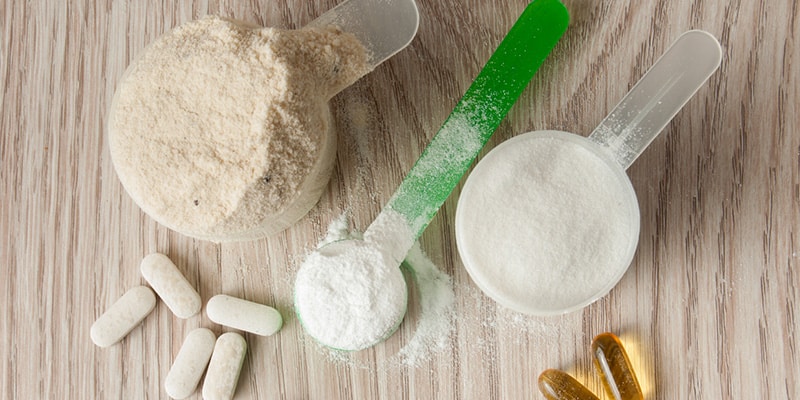The Right Way To Include a Pre-workout Supplement in Your Routine

So you’ve decided to start using a pre-workout supplement. Congratulations, you’re taking the next step toward igniting your training sessions and improving your athletic performance! Though, you most likely know by now that not all supplements are created equal.
The problem with most pre-workout supplements is that they contain the right ingredients but at excessive concentrations. Take those convenience store pre-workout energy drinks and supplements, for example. Most of them are packed with simple carbs (i.e. sugar) and caffeine. While carbohydrates can fuel your workout, massive amounts of carbs cause a spike in blood sugar and insulin levels, leading to a corresponding low blood sugar crash. Additionally, they block your body’s ability to burn fat stores – not a desirable effect if your goal is to lose weight.
The same goes for caffeine; in moderate amounts caffeine can help you to push through an intense workout. However, many pre-workout supplements contain too much caffeine, which can leave you feeling jittery, nervous, or even nauseous – not the formula for a successful workout.
Understanding what ingredients and quantities to look for on the label of your pre-workout supplement is crucial to maximize your endurance, strength, and fat-burning during your training. Plus, knowing the appropriate time to mix up your pre-sweat prep can enhance your results even further. If you want to learn the right way to include a pre-workout supplement in your routine, keep reading to see what we found out from the experts.
Read the label

Before you can include a pre-workout supplement in your routine, you’ll have to find a brand that provides ingredients which have been proven to increase your energy in a safe, effective way. Start by reading the label. Key ingredients to look for include carbohydrates, caffeine (preferably in the form of green tea), citrulline, arginine AKG, beta-alanine, and creatine monohydrate.
Carbohydrates
Carbohydrates are essential to any athlete’s prep routine, especially if you’re exercising for more than an hour at a time. Nancy Clark, RD, author of Nancy Clark’s Sports Nutrition Guidebook, shares with the Daily Burn: “Carbs refuel your muscles, and get stored as glycogen. When glycogen is depleted, that’s what’s associated with fatigue and hitting the wall.”
However, this isn’t to say you should stuff your face with a plate full of pasta right before a workout. Rather, you should fuel yourself with simple carbs from a light snack or a pre-workout supplement. Simple carbohydrates are great for 30 minutes to an hour before a workout as they provide the body with fast acting glucose as fuel.
According to the Academy of Nutrition and Dietetics, people who engage in a heavy, high-intensity training routine should consume 3 to 4.5 grams of carbohydrates per pound of bodyweight on a daily basis.
Caffeine
A pre-workout supplement that contains just the right amount of caffeine can be the key to making even the toughest workouts feel less brutal. Recent research by the American College of Sports Medicine found that athletes who consumed 5 mg of caffeine per kilogram of body weight 60 minutes prior to a workout increased their endurance during spinning and running tests.
The benefits from caffeine come from its ability to stimulate the central nervous system, raising alertness and focus. Plus, caffeine also has a mild fat burning effect, which can spare carbohydrate and enhance endurance performance. Jeff S. Volek, Ph.D., R.D., recommends to Nutrition Express that an effective caffeine dose for a pre-workout supplement is between 100 and 200 mg, equivalent to about 1-2 cups of coffee.
Citrulline
Citrulline is one of the hottest all-natural ingredients currently on the market. Mike Roussell, PhD, tells bodybuilding.com that, “No modern pre-workout or pump-boosting supplement is complete without citrulline.” So what exactly is citrulline and why do you need it?
Citrulline is an amino acid that is produced as a byproduct when the body converts the amino acid arginine to nitric oxide (NO). Studies have shown that an excess amount of citrulline increases the levels of arginine in the blood, which leads to increased NO production. More NO means more blood flow to muscles during exercise, enabling them to last longer and push harder through your workouts.
Arginine Alpha-ketoglutarate (AAKG)
As mentioned above, arginine is an amino acid that is necessary for the production of NO. Including a pre-workout supplement in your routine that contains arginine AKG is important because “both AAKG and nitric oxide amplify the beneficial muscle-building effects of exercising and nutritional supplements,” explains registered dietitian and American Dietetic Association spokesperson Jim White.
Beta-alanine
Beta-alanine is a naturally-occurring beta-amino acid and a component of the histidine dipeptides carnosine and anserine, as well as vitamin B5, or pantothenic acid. Supplementing with beta-alanine enhances your athletic performance by raising muscle carnosine concentrations. Muscle carnosine has been reported to serve as a physiological buffer, possess antioxidant properties, and influence enzyme regulation. Beta-alanine has been shown to increase carnosine concentrations in skeletal muscle by 20-80%. (Nutrients. 2010)
Creatine Monohydrate
Researchers have known of the use of creatine as an energy source by skeletal muscles since the middle of the 20th century. Thus, numerous studies have been conducted regarding the relationship between creatine and athletic performance. Results from studies support that creatine supplementation increases muscle creatine levels and high-intensity exercise performance.
Jeff S. Volek, Ph.D., R.D., tells Nutrition Express, “I would give it 5 out of 5 stars on a rating scale for athletes to combine it with weight training. Creatine boosts muscle strength and power.”
Research indicates that muscle creatine accumulation occurs over 3 to 5 days of multiple daily doses of about 5 grams. A maintenance dose of 3 to 5 grams is then required to keep muscle creatine levels elevated. Thus, the right way to include a pre-workout supplement in your routine is to check the label for creatine monohydrate with the quantity of 3 to 5 grams.
Timing is everything

Now that you know what to look for on a pre-workout supplement label, the next step is to understand the timing for your pre-sweat prep. According to bodybuilding.com, the right way to include a pre-workout supplement in your routine is to take it within an hour before training. This will allow for the time needed for the supplement to get into your bloodstream.
It’s important not to take your pre-workout supplement more than an hour before you plan to train because once these energy, strength, and pump producing nutrients become available your body will quickly burn through them.
You can get the pump you’re craving with PI’s all-natural Pre-Workout supplement mix. This explosive blend contains all of the high-performance ingredients mentioned above and was designed to naturally work with your body to deliver maximum stamina, strength, and focus. Plus with fresh flavors like Natural Raspberry Lemonade and Tropical Punch, you’ll be cranked up for a killer workout without the shakes or quakes afterward.



2 thoughts on “The Right Way To Include a Pre-workout Supplement in Your Routine”
This is very important and I bet, a lot of people incorporate supplements in their workout but they are not doing it the right way.
Finding the right and effective pre-workout supplements can be hard. One should be really careful and thorough when it comes to buying and taking a workout supplement. I have witnessed some of my friends who are also working out and taking a supplement that is not as effective it would be appropriate for their workout routine. Thank you for these really helpful guide so others can also get ideas the right way to include a pre-workout supplement. I’m glad to share these with my friends who are working out or planning to.